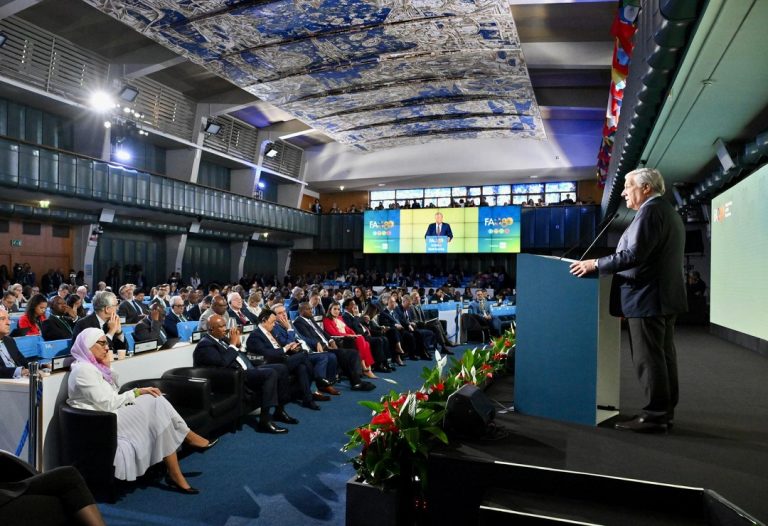A trip to examine Italy’s political, cooperation and military initiatives in Lebanon. That was the theme of the visit by the Deputy Foreign Minister with responsibility for Development Cooperation, Lapo Pistelli, to Lebanon on 25 and 26 June 2013. He visited Beirut, where he met the President of the Republic, Michel Suleiman; the Prime Minister designate, Tammam Salam; and the Speaker of the Parliament, Nabih Berri. In the afternoon of 25 June Pistelli travelled to the Shamaa military base, where the Italian contingent in the UN mission in southern Lebanon (UNIFIL) is based. This was followed, on the morning of 26 June, by a visit to the Palestinian refugee camp at Shatila and to the Bekaa Valley, in both of which the effects of the Syrian conflict are evident.
Lebanon is paying the price of the crisis in Syria
Indeed, the Syrian crisis was a common theme running throughout Lapo Pistelli’s visit to Lebanon. The country “is at risk, along with Jordan, of being the first victim of the contagion spreading from the Syrian conflict”, he commented. “Lebanon is paying a high price in terms of the inflow of Syrian and Palestinian refugees. I would like my fellow Italians to think for just a second of what would happen if Italy had to take in 6 million refugees for a year. Because, in percentage terms, that’s what the total in Lebanon equates to. And most of the refugees are from vulnerable categories of the population: women and children”.
At the end of his meeting with the Speaker of the Lebanese Parliament, Nabih Berri, Pistelli commented that “Berri agrees with our view that every effort must be made to ensure that the international conference in Geneva takes place. He agrees, most notably, that the time has come to impose a solution on the Syrians”.
“Each actor concerned must shoulder its responsibilities. Starting with the United States and Russia, but also Saudi Arabia, Turkey, Egypt and Iran. Berri and I agree that if the Geneva conference fails, then the risk is that Syria will break up”, underscored the Deputy Minister.
Italy at Prime Minister Salam’s side in his efforts to form government of national unity
The sensitive political situation in Lebanon was evident during Pistelli’s meetings. Lebanon has been awaiting the formation of a new government for over two months now and the consultations opened by Prime Minister designate Salam have been marked by tensions deriving from the conflict in Syria. “Lebanon”, explained Pistelli, “needs a political government of national unity, not least to tackle more effectively the risk of contagion from the Syrian crisis. […] Italy, without interfering, supports the prime minister’s efforts to achieve that”.
Pistelli visits Italian UNIFIL contingent: “We’re proud of you”
Another aspect of the Deputy Minister’s visit was Italy’s approach to Lebanon and indeed to the entire region. An approach, as Pistelli himself remarked, shaped like a trident: one point is political, the second development cooperation and the third military, with our role in the UN’s UNIFIL contingent.
And Italy’s military personnel were the focus of the second leg of his visit, to the Shamaa base south-east of Tyre, just a few kilometres from the Blue Line – the border demarcation with Israel.
On his arrival by helicopter from Beirut, the Deputy Minister was welcome to the base by General Vasco Angelotti, current commander of the Italian contingent covering the western sector of UNIFIL’s zone of responsibility. “We’re proud. We’re at your side”, Pistelli told the officers in charge of the various task forces of the Italian contingent. He reiterated “the importance of your presence in southern Lebanon”.
Refugee camps and Italian Development Cooperation projects in the Bekaa Valley
Italian Development Cooperation and the humanitarian tragedy caused by the Syrian crisis were the key themes of Pistelli’s second day in Lebanon. On the morning of 26 June the Deputy Minister visited the Palestinian refugee camp at Shatila, where he met representatives of the United Nations Relief and Works Agency and was received by families of Palestinian refugees from Syria. The war has caused over 100,000 deaths and led at least 500,000 refugees to flee to Lebanon, 70,000 of them Palestinian.
Deputy Minister Pistelli’s visit will also include a visit to a Syrian refugee camp in the eastern Bekaa Valley and to an Italian Development Cooperation project in the region – an area suffering from growing and violent religious tensions linked to the conflict in Syria.
Before returning to Rome, Pistelli will be meeting the out-going Social Affairs Minister, Wael Bou Faour. His visit will also include a tour of the national museum, which houses the Roman Tomb of Tyre, discovered in the southern Lebanese port and restored by Italian experts with Italian development cooperation funding.


